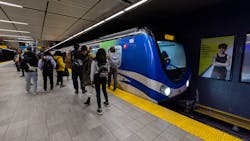British Columbia providing C$479 million to TransLink to stabilize finances
The government of British Columbia is contributing C$479 million (US$348.47 million) to TransLink to help address the agency’s financial challenges, maintain service levels and support its planned expansion efforts.
“Hundreds of thousands of people rely on TransLink’s service every day to get to work, travel to school and access all parts of the region,” said British Columbia Premier David Eby. “Failing to act now would lead to higher fares, fewer buses on the road and reduced service across the board. We won’t let that happen.”
“Accessible public transit is critical for the region’s economic, social and environmental health now and into the future,” said British Columbia Minister of Transportation and Infrastructure Rob Fleming. “The province will continue discussions with the federal government on a potential funding partnership. However, given TransLink’s significant and immediate needs, the province is taking action with this funding stabilization to address TransLink’s short-term operating funding needs, preventing layoffs and maintaining transit services that will create jobs and reduce traffic congestion and air pollution, which benefits residents and visitors to Metro Vancouver.”
The provincial funding will allow TransLink to maintain actions on five fronts, including:
- Keeping fares stable
- Supporting public transit infrastructure and services
- Avoiding service cuts
- Continuing to provide free public transit for kids 12 and younger
- Enabling transit expansion plans needed to respond to growing communities
TransLink is not alone among peer agencies in facing a tight financial situation in the current environment that includes escalating costs and shifting commuting patterns. While long-term projections anticipate finances to improve, the contribution from the provincial government will help stabilize TransLink’s finances in the short term and allow the authority to continue to advance capital projects in its 2022 investment plan, including TransLink’s battery-electric bus fleet expansion to 155 buses by 2025. The funding will increase service on TransLink’s busiest routes through strategic service reallocation, expand RapidBus lines to relieve congestion in high-growth corridors, increase active transportation investments and support transit-oriented communities.
“I’d like to thank the provincial government for providing certainty to nearly 400,000 people who depend on our transit system every day. This significant funding package will allow us to maintain our transit service levels for the immediate future. We will continue our important work to secure new sources of long-term revenue and investment for much-needed expansion projects outlined in the Mayors’ Council’s 10-year priorities,” said TransLink CEO Kevin Quinn.
About the Author

Mischa Wanek-Libman
Group Editorial Director
Mischa Wanek-Libman is director of communications with Transdev North America. She has more than 20 years of experience working in the transportation industry covering construction projects, engineering challenges, transit and rail operations and best practices.
Wanek-Libman has held top editorial positions at freight rail and public transportation business-to-business publications including as editor-in-chief and editorial director of Mass Transit from 2018-2024. She has been recognized for editorial excellence through her individual work, as well as for collaborative content.
She is an active member of the American Public Transportation Association's Marketing and Communications Committee and served 14 years as a Board Observer on the National Railroad Construction and Maintenance Association (NRC) Board of Directors.
She is a graduate of Drake University in Des Moines, Iowa, where she earned a Bachelor of Arts degree in Journalism and Mass Communication.

